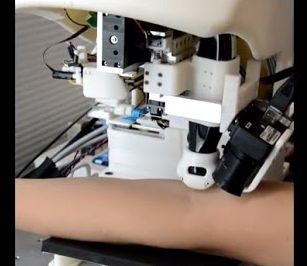Sep 7, 2016
Quantum Computing: Artificial Intelligence Is Here
Posted by Karen Hurst in categories: computing, quantum physics, robotics/AI
Geordie’s perspective of AI on QC…
Continue reading “Quantum Computing: Artificial Intelligence Is Here” »

Geordie’s perspective of AI on QC…
Continue reading “Quantum Computing: Artificial Intelligence Is Here” »
I am glad that more folks are beginning to start to understand the magnitude and depth of the risk & exposure that QC presents even within the next 4 to 5 years. However, what about everyone else? Folks need to understand that the transformation to QC in the infrastructure alone is a substantial investment and timeline. So, as I have highlighted many times; I hope folks have baked in QC into their future state architectures & investments because a transformation (depending on company size and complexity) could span many, many years.
The study purports there is a 50 per cent risk that many of the cybersecurity tools used by financial institutions, online retailers and government agencies will be obsolete by 2031.
September 6, 2016 by Canadian Manufacturing.com Staff.
“KryptAll COMBATS QUANTUM COMPUTING” — The problem is that it will not be available until 2021 to combat hackers who have access to QC. And, lets not forget that 2 weeks ago China has proven they have Quantum communications along with their own work on QC in general.
Be Certain Your Calls Are Safe
KryptAll is dedicated to keeping your calls safe.
Scientists at the Energy Department’s National Renewable Energy Laboratory (NREL) discovered a use for perovskites that runs counter to the intended usage of the hybrid organic-inorganic material.
Considerable research at NREL and elsewhere has been conducted into the use of organic-inorganic hybrid perovskites as a solar cell. Perovskite systems have been shown to be highly efficient at converting sunlight to electricity. Experimenting on a lead-halide perovskite, NREL researchers found evidence the material could have great potential for optoelectronic applications beyond photovoltaics, including in the field of quantum computers.
Today, Nature Communications published the research, Large Polarization-Dependent Exciton Optical Stark Effect in Lead Iodide Perovskites. Authors of the paper are Ye Yang, Mengjin Yang, Kai Zhu, Justin Johnson, Joseph Berry, Jao van de Lagemaat, and Matthew Beard.
Additional insights on QSS planned efforts; and (as with any government program) there is more to this program than these insights.
While China’s quantum science satellite (QSS) project is part of the Strategic Priority Programme on Space Science, the country’s first space exploration programme intended purely for scientific research, its experiments have significant military implications.
By Michael Raska
Mercedes-Benz Vans and drone tech startup Matternet have created a concept car, or as they’re calling it a Vision Van, that could change the way small packages are delivered across short distances.
The Vision Van’s rooftop serves as a launch and landing pad for Matternet’s new, Matternet M2 drones.
The Matternet M2 drones, which are autonomous, can pick up and carry a package of 4.4 pounds across 12 miles of sky on a single battery charge in real world conditions.
Continue reading “Mercedes-Benz and Matternet unveil vans that launch delivery drones” »

Let’s see what medical robots we inevitably work closely in the future. From surgical precision to taking blood samples, robotics in healthcare is coming.
These digestible “robots” can be packed into a pill casing and swallowed like any old aspirin.
Meet the future of medical robotics.
Silicon Valley, or the Greater Bay Area, is the 18th largest economy in the world, more than half the size of Canada’s economy and bigger than Switzerland, Saudi Arabia or Turkey. This is because the region has become the world leader in research and development of emerging technologies such as artificial intelligence, robotics, software and virtual reality.
“Software is eating the world,” said Silicon Valley investor Marc Andreessen famously in 2011. It was controversial but prescient.
Five years later, software-driven machines and drones perform surgery, write news stories, compose music, translate, analyze, wage war, guard, listen, speak and entertain. The world’s biggest box office hits — animated films such as “Frozen” or special effects in Hollywood blockbusters like “Star Wars” — are made using software.
Continue reading “How robots, drones and artificial intelligence will change everything” »
In people with Alzheimer’s disease, a new investigational drug can dramatically reduce the amount of amyloid beta plaque, the tangled clumps of proteins that form in the brains of Alzheimer’s patients, according to a new early study of the drug.
The drug works by spurring the immune system to recognize and clear the plaques.
“We believe that’s a hint of efficacy,” study co-author Dr. Alfred Sandrock, a neurologist and an executive vice president at Biogen, said during a news briefing. “We believe that needs to be confirmed with further studies.” Biogen is the Cambridge, Massachusetts, company that funded the trial and applied to patent the drug. [10 Things You Didn’t Know About the Brain].
Continue reading “New Drug Clears Abnormal Brain Proteins Tied to Alzheimer’s” »
